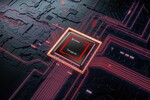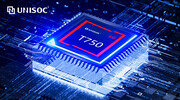UNISOC T820 vs UNISOC T750
UNISOC T820
► remove from comparison
Der UniSoc T820 Tanggula ist ein Mittelklasse-SoC mit 8 Prozessorkernen in drei Clustern. Als Prime-Core gibt es einen schnellen ARM Cortex-A76 mit bis zu 2,7 GHz. Drei weitere A76-Performance-Kerne können mit bis zu 2,3 GHz getaktet werden. Zum Stromsparen gibt es einen dritten Cluster mit vier ARM Cortex-A55 Cores mit bis zu 2,1 GHz. Der integrierte Speicherkontroller unterstützt LPDDR4/4X mit bis zu 2133 MHz (2x 16 Bit). Der integrierte ISP unterstützt zwei Hauptkameras und 2 Nebenkameras (eine bis zu 108 MPixel). Als integrierte Grafikkarte kommt eine ARM Mali-G57 MC4 (4 Kerne) zum Einsatz. Weiters unterstützt der T820 auch AI Beschleunigung in Hardware (8 TOPS Maximalleistung).
Der Chip wird im aktuellen 6nm EUV Prozess gefertigt und sollte eine gute Stromeffizienz aufweisen.
UNISOC T750
► remove from comparison
Der UniSoc T750 (früher auch Tanggula) ist ein Mittelklasse-SoC mit 8 Prozessorkernen in zwei Clustern. Die zwei großen ARM Cortex-A76-Kerne werden mit bis zu 2 GHz getaktet. Zum Stromsparen sind 6 kleine ARM ARM Cortex-A55-Kerne mit 1.8 GHz integriert. Der schnellere UniSoc T760 bietet im Vergleich vier große A76 Kerne und unterstützt schnelleren Hauptspeicher.
Der integrierte Speicherkontroller unterstützt LPDDR4X mit bis zu 1866 MHz. Der integrierte ISP unterstützt zwei Hauptkameras (eine bis zu 64 MPixel). Als integrierte Grafikkarte kommt eine ARM Mali-G57 MC2 (2 Kerne) mit bis zu 680 MHz zum Einsatz. Weiters integriert der SoC noch 802.11ac (Wi-Fi 5), Bluetooth. 5.0, FM-Radio, GPS / Glonass / Baeidou / Galileo und 5G (TDD+FDD CA Sub-6Ghz) / LTE (Cat15 DL, Cat18 UL).
Der Chip wird im aktuellen 6nm Prozess gefertigt und sollte eine gute Stromeffizienz aufweisen.
| Model | UNISOC T820 | UNISOC T750 | ||||||||||||||||||||||||||||||||||||||||||||||||||||||||||||||||||||||||||||||||||||||||||||||||||||||||||||||||
| Series | ||||||||||||||||||||||||||||||||||||||||||||||||||||||||||||||||||||||||||||||||||||||||||||||||||||||||||||||||||
| Codename | Cortex-A76 / A55 | Cortex-A76 / A55 | ||||||||||||||||||||||||||||||||||||||||||||||||||||||||||||||||||||||||||||||||||||||||||||||||||||||||||||||||
| Serie: Cortex-A76 / A55 |
|
| ||||||||||||||||||||||||||||||||||||||||||||||||||||||||||||||||||||||||||||||||||||||||||||||||||||||||||||||||
| Clock | 2100 - 2700 MHz | 1800 - 2000 MHz | ||||||||||||||||||||||||||||||||||||||||||||||||||||||||||||||||||||||||||||||||||||||||||||||||||||||||||||||||
| Cores / Threads | 8 / 8 | 8 / 8 2 x 2.0 GHz ARM Cortex-A76 6 x 1.8 GHz ARM Cortex-A55 | ||||||||||||||||||||||||||||||||||||||||||||||||||||||||||||||||||||||||||||||||||||||||||||||||||||||||||||||||
| Technology | 6 nm | 6 nm | ||||||||||||||||||||||||||||||||||||||||||||||||||||||||||||||||||||||||||||||||||||||||||||||||||||||||||||||||
| Features | ISP (2 main + 2 subsidiary, 108M 9-in-1, 64M ZSL) | 5G, LTE, ISP (up to 64MPixel), eMMC 5.1, UFS 3.1, LPDDR4X 1866MHz, LTE, GPS, Glonass, Beidou, Galileo, 802.11 b/g/n/ac, Bloetooth 5.0, FM-Radio, TEE Security | ||||||||||||||||||||||||||||||||||||||||||||||||||||||||||||||||||||||||||||||||||||||||||||||||||||||||||||||||
| iGPU | ARM Mali-G57 MP4 ( - 850 MHz) | ARM Mali-G57 MP2 ( - 680 MHz) | ||||||||||||||||||||||||||||||||||||||||||||||||||||||||||||||||||||||||||||||||||||||||||||||||||||||||||||||||
| Architecture | ARM | ARM | ||||||||||||||||||||||||||||||||||||||||||||||||||||||||||||||||||||||||||||||||||||||||||||||||||||||||||||||||
| Announced | ||||||||||||||||||||||||||||||||||||||||||||||||||||||||||||||||||||||||||||||||||||||||||||||||||||||||||||||||||
| L3 Cache | 3 MB |


 Deutsch
Deutsch English
English Español
Español Français
Français Italiano
Italiano Nederlands
Nederlands Polski
Polski Português
Português Русский
Русский Türkçe
Türkçe Svenska
Svenska Chinese
Chinese Magyar
Magyar